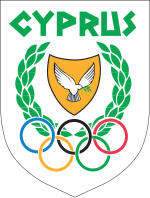The Cyprus National Olympic Committee (NOC Cyprus) is pleased to be a partner in the new Erasmus+ Project named “Strengthening Response Mechanism for Safeguarding in European Sports” (SAFE HARBOUR), which is coordinated by the European Olympic Committees EU Office (EOC EU Office). This initiative is dedicated to enhancing safeguarding mechanisms across European sport, creating safer environments for all.
About NOC Cyprus

NOC Cyprus stands as the governing body overseeing the Olympic Movement in the Republic of Cyprus. Established in 1974, NOC Cyprus serves as the central organisation responsible for promoting and coordinating Olympic-related activities across the island nation. Through its commitment to fostering excellence in sport, promoting Olympic values, and supporting athletes, the NOC Cyprus plays a pivotal role in the development of sports in Cyprus.
At the core of the NOC Cyprus’s mission is the promotion of the Olympic ideals of friendship, respect, and excellence. Through its programs and initiatives, the NOC Cyprus seeks to inspire and empower athletes to strive for their best both on and off the field of play. By promoting a culture of fair play, sportsmanship, and integrity, the NOC Cyprus aims to instil values that extend beyond sport and contribute to the overall well-being of society.
One of the primary functions of the NOC Cyprus is to select and support athletes to represent Cyprus at the Olympic Games, as well as other international competitions. Through its rigorous selection process, the NOC Cyprus identifies talented athletes who demonstrate the potential to compete at the highest level. Once selected, these athletes receive support and resources to help them prepare for and participate in major international events, including access to training facilities, coaching, and financial assistance. In addition to supporting elite athletes, the NOC Cyprus is also committed to promoting sports participation and development at all levels. Through partnerships with national sports federations, government agencies, and other stakeholders, the NOC Cyprus works to expand access to sports programs and facilities across the country. By investing in grassroots initiatives and youth development programs, the NOC Cyprus aims to nurture the next generation of athletes and promote a lifelong love of sport.
The NOC Cyprus also plays a crucial role in promoting gender equality and inclusivity in sports. Recognizing the importance of ensuring equal opportunities for all athletes, regardless of gender, ethnicity, or background, the NOC Cyprus advocates for policies and programs that promote diversity and inclusion within the sports community. By encouraging participation from underrepresented groups and supporting initiatives that promote gender equity in sports leadership and governance, the NOC Cyprus is working to create a more inclusive and equitable sports environment in Cyprus. The NOC Cyprus also works closely with the International Olympic Committee (IOC) and other national Olympic committees to promote cooperation and collaboration within the Olympic Movement. By participating in international events, conferences, and initiatives, the NOC Cyprus helps to strengthen ties between Cyprus and the global sports community, while also advocating for the interests and priorities of Cypriot athletes and sports organizations on the international stage.
Looking ahead, the NOC Cyprus remains committed to its mission of promoting excellence, inclusivity, and the Olympic spirit in Cyprus. By continuing to invest in athlete development, sports participation, and Olympic education, the NOC Cyprus aims to build a stronger, more vibrant sports community that reflects the values and ideals of the Olympic Movement. Through its efforts, the NOC Cyprus seeks to inspire future generations of athletes and contribute to a healthier, more active, and more united society in Cyprus and beyond.
The importance of the involvement in the SAFE HARBOUR project
For NOC Cyprus, the involvement in the SAFE HARBOUR project is important for several reasons, including:
NOC Cyprus’ goals and purpose is to create policies and a technical manual that all stakeholders should follow.
The role of NOC Cyprus within the SAFE HARBOUR project
Within the SAFE HARBOUR project, NOC Cyprus will play a critical role in tailoring the European Response framework to its national context. Responsibilities include drafting a National Strategy to guide safeguarding actions, delivering mandatory training for the leadership and National Federations, and hosting a National Multiplier Event to raise awareness among stakeholders. Additionally, NOC Cyprus will engage in peer-to-peer roundtables, contribute to thematic seminars, and disseminate the project results through various channels. By actively participating in all project activities, NOC Cyprus will help ensure the successful implementation and sustainability of safeguarding measures.
Background information on the SAFE HARBOUR project
The SAFE HARBOUR project, short for “Strengthening Response Mechanisms for Safeguarding in European Sport”, is a 30-month project co-funded by the European Union through the Erasmus+ Sport Programme 2024. Coordinated by the EOC EU Office, the consortium includes Thomas More and Asser Institute as experts on safeguarding, human rights and law, 2 International Federations (International Biathlon Union and International Ice Hockey Federations), and 20 National Olympic Committees (Belgium, Bosnia and Herzegovina, Croatia, Cyprus, Czechia, Denmark, Germany, Hungary, Kosovo, Latvia, Lithuania, Luxembourg, Malta, Montenegro, Norway, Poland, Portugal, Romania, Slovakia and Slovenia). Additionally, the International Olympic Committee (IOC) is involved as an outside resource.
The project seeks to strengthen the capacity of European NOCs and Federations to address safeguarding concerns by identifying gaps, developing a European Response framework, and fostering collaboration. This framework will be adapted to national contexts, complemented by training and awareness initiatives to enhance safeguarding measures at both national and European levels. Therefore, SAFE HARBOUR aims to equip partner NOCs and Federations with the tools and confidence to implement effective safeguarding measures while establishing a robust support network for Safeguarding Officers and laying the groundwork for a future IOC Regional Safeguarding Hub.
![]()
![]()